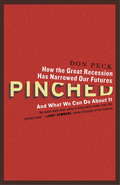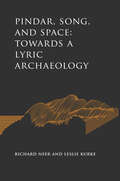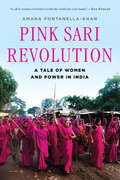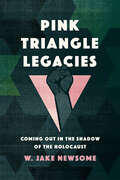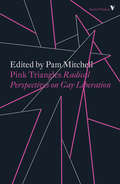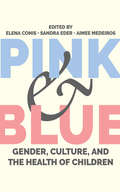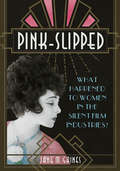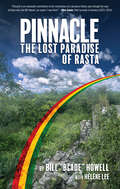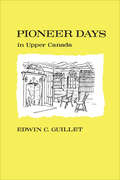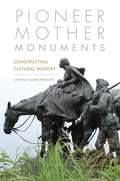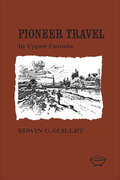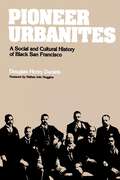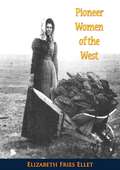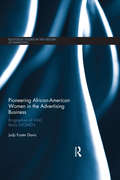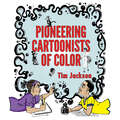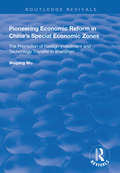- Table View
- List View
Pinball Wizards: Jackpots, Drains, and the Cult of the Silver Ball
by Adam RubenPinball's history is America's history, from gambling and war-themed machines to the arcade revolution and, ultimately, the decline of the need to leave your house. The strangest thing about pinball is that it persists, and not just as nostalgia. Pinball didn't just stick around—it grew and continues to evolve with the times. Somehow, in today's iPhone world, a three-hundred-pound monstrosity of wood and cables has survived to enjoy yet another renaissance. Pinball is more to humor writer Adam Ruben than a fascinating book topic—it's a lifelong obsession. Ruben played competitive pinball for years, rising as high as the 80th-ranked player in the world. Then he had children. Now, mired in 9,938th place—darn kids—Ruben tries to stage a comeback, visiting pinball museums, gaming conventions, pinball machine designers, and even pinball factories in his attempt to discover what makes the world's best players, the real wizards, so good. Along the way, Ruben examines the bigger story of pinball's invention, ascent, near defeat, resurgence, near defeat again, and struggle to find its niche in modern society.
Pinched
by Don PeckThe Great Recession is not done with us yet. While the most acute part of the economic crisis is past, the recession's most significant impact on American life still lies in the future. The personal, social, and cultural changes that result from severe economic shocks build and manifest themselves only slowly. But history shows us that, ultimately, shocks this severe profoundly alter the character of society. Don Peck's Pinched, a fascinating and harrowing exploration of our dramatic economic climate, keenly observes how the recession has changed the places we live, the work we do, and even who we are--and details the transformations that are yet to come. Every class and every generation will be affected: newly minted college graduates, blue-collar men, affluent professionals, exurban families, elite financiers, inner city youth, middle-class retirees. This was not an ordinary recession, and ordinary responses will not fully end it. The crash has shifted the course of the economy. In its aftermath, the middle class is shrinking faster, wealth is becoming more concentrated, twenty-somethings are sinking, and working-class families and communities are changing in unsavory ways. We sit today between two eras, buffeted, anxious, and uncertain of the future. Through vivid reporting and lucid argument, Peck helps us make sense of how our society has changed, and why so many people are still struggling. The answers to these questions reveal a new way forward for America. The country has endured periods like this one before, and has emerged all the stronger from them; adaptation and reinvention have been perhaps the nation's best and most enduring traits. The time is ripe for another such reinvention. Pinched lays out the principles and public actions that can help us pull it off. From the Hardcover edition.
Pindar, Song, and Space: Towards a Lyric Archaeology (Cultural Histories of the Ancient World)
by Richard Neer Leslie KurkeA groundbreaking study of the interaction of poetry, performance, and the built environment in ancient Greece.Winner of the PROSE Award for Best Book in Classics by the Association of American PublishersIn this volume, Richard Neer and Leslie Kurke develop a new, integrated approach to classical Greece: a "lyric archaeology" that combines literary and art-historical analysis with archaeological and epigraphic materials. At the heart of the book is the great poet Pindar of Thebes, best known for his magnificent odes in honor of victors at the Olympic Games and other competitions. Unlike the quintessentially personal genre of modern lyric, these poems were destined for public performance by choruses of dancing men. Neer and Kurke go further to show that they were also site-specific: as the dancers moved through the space of a city or a sanctuary, their song would refer to local monuments and landmarks. Part of Pindar's brief, they argue, was to weave words and bodies into elaborate tapestries of myth and geography and, in so doing, to re-imagine the very fabric of the city-state. Pindar's poems, in short, were tools for making sense of space. Recent scholarship has tended to isolate poetry, art, and archaeology. But Neer and Kurke show that these distinctions are artificial. Poems, statues, bronzes, tombs, boundary stones, roadways, beacons, and buildings worked together as a "suite" of technologies for organizing landscapes, cityscapes, and territories. Studying these technologies in tandem reveals the procedures and criteria by which the Greeks understood relations of nearness and distance, "here" and "there"—and how these ways of inhabiting space were essentially political.Rooted in close readings of individual poems, buildings, and works of art, Pindar, Song, and Space ranges from Athens to Libya, Sicily to Rhodes, to provide a revelatory new understanding of the world the Greeks built—and a new model for studying the ancient world.
Pinelandia: An Anthropology and Field Poetics of War and Empire (Atelier: Ethnographic Inquiry in the Twenty-First Century #8)
by Nomi StoneAcross the pine forests and deserts of America, there are mock Middle Eastern villages, mostly hidden from public view. Containing mosques, restaurants, street signs, graffiti in Arabic, and Iraqi role-players, these villages serve as military training sites for cultural literacy and special operations, both seen as crucial to victory in the Global War on Terror. In her gripping and highly original ethnography, anthropologist Nomi Stone explores US military predeployment training exercises and the lifeworlds of the Iraqi role-players employed within the mock villages, as they act out to mourn, bargain, and die like the wartime adversary or ally. Spanning fieldwork across the United States and Jordan, Pinelandia traces the devastating consequences of a military project that seeks to turn human beings into wartime technologies recruited to translate, mediate, and collaborate. Theorizing and enacting a field poetics, this work enlarges the ethnographic project into new cross-disciplinary worlds. Pinelandia is a political phenomenology of American empire and Iraq in the twenty-first century.
Pinheads and Patriots: Where You Stand in the Age of Obama
by Bill O'ReillyTelevision host, razor sharp political pundit, and #1 bestselling author Bill O’Reilly focuses in on where we all stand in the Age of Obama in Pinheads and Patriots. In this brave, hard-hitting, provocative volume, the author of Culture Warrior and A Bold, Fresh Piece of Humanity guides Americans through the extensive transformations sweeping their country and explains exactly what these profound changes mean for every one of us.
Pink 2.0: Encoding Queer Cinema on the Internet
by Noah A. TsikaIn an era where digital media converges with new technologies that allow for cropping, remixing, extracting, and pirating, a second life for traditional media appears via the internet and emerging platforms. Pink 2.0 examines the mechanisms through which the internet and associated technologies both produce and limit the intelligibility of contemporary queer cinema. Challenging conventional conceptions of the internet as an exceptionally queer medium, Noah A. Tsika explores the constraints that publishers, advertisers, and content farms place on queer cinema as a category of production, distribution, and reception. He shows how the commercial internet is increasingly characterized by the algorithmic reduction of diverse queer films to the dimensions of a highly valued white, middle-class gay masculinity--a phenomenon that he terms "Pink 2.0." Excavating a rich set of online materials through the practice of media archaeology, he demonstrates how the internet's early and intense associations with gay male consumers (and vice versa) have not only survived the medium's dramatic global expansion but have also shaped a series of strategies for producing and consuming queer cinema. Identifying alternatives to such corporate and technological constraints, Tsika uncovers the vibrant lives of queer cinema in the complex, contentious, and libidinous pockets of the internet where resistant forms of queer fandom thrive.
Pink Brain, Blue Brain: How Small Differences Grow Into Troublesome Gaps—And What We Can Do About It
by Lise EliotA scientific study of the differences between boys & girls that tackles damaging gender stereotypes and offers practical guidance for parents & educators.In the past decade, we’ve heard a lot about the innate differences between males and females, so we’ve come to accept that boys can’t focus in the classroom and girls are obsessed with relationships. In Pink Brain, Blue Brain, neuroscientist Lise Eliot turns that thinking on its head. Presenting the latest science from birth to puberty, Eliot zeroes in on the precise differences between boys and girls, reining in harmful stereotypes. She argues convincingly that infant brains are so malleable that what begin as small differences at birth become amplified over time, as parents and teachers—and the culture at large—unwittingly reinforce gender stereotypes.The good news is that by appreciating how sex differences emerge—rather than assuming them to be fixed biological facts—we can help all children reach their fullest potential. Eliot offers teachers and parents concrete ways to help close the troubling gaps between boys and girls ultimately end the gender wars that currently divide us.
Pink Noises: Women on Electronic Music and Sound
by Tara RodgersPink Noises brings together twenty-four interviews with women in electronic music and sound cultures, including club and radio DJs, remixers, composers, improvisers, instrument builders, and installation and performance artists. The collection is an extension of Pinknoises. com, the critically-acclaimed website founded by musician and scholar Tara Rodgers in 2000 to promote women in electronic music and make information about music production more accessible to women and girls. That site featured interviews that Rodgers conducted with women artists, exploring their personal histories, their creative methods, and the roles of gender in their work. This book offers new and lengthier interviews, a critical introduction, and resources for further research and technological engagement. Contemporary electronic music practices are illuminated through the stories of women artists of different generations and cultural backgrounds. They include the creators of ambient soundscapes, "performance novels," sound sculptures, and custom software, as well as the developer of the Deep Listening philosophy and the founders of the Liquid Sound Lounge radio show and the monthly Basement Bhangra parties in New York. These and many other artists open up about topics such as their conflicted relationships to formal music training and mainstream media representations of women in electronic music. They discuss using sound to work creatively with structures of time and space, and voice and language; challenge distinctions of nature and culture; question norms of technological practice; and balance their needs for productive solitude with collaboration and community. Whether designing and building modular synthesizers with analog circuits or performing with a wearable apparatus that translates muscle movements into electronic sound, these artists expand notions of who and what counts in matters of invention, production, and noisemaking. Pink Noises is a powerful testimony to the presence and vitality of women in electronic music cultures, and to the relevance of sound to feminist concerns. Interviewees: Maria Chavez, Beth Coleman (M. Singe), Antye Greie (AGF), Jeannie Hopper, Bevin Kelley (Blevin Blectum), Christina Kubisch, Le Tigre, Annea Lockwood, Giulia Loli (DJ Mutamassik), Rekha Malhotra (DJ Rekha), Riz Maslen (Neotropic), Kaffe Matthews, Susan Morabito, Ikue Mori, Pauline Oliveros, Pamela Z, Chantal Passamonte (Mira Calix), Maggi Payne, Eliane Radigue, Jessica Rylan, Carla Scaletti, Laetitia Sonami, Bev Stanton (Arthur Loves Plastic), Keiko Uenishi (o. blaat)
Pink Ribbons, Inc.: Breast Cancer and the Politics of Philanthropy
by Samantha King&“Samantha King explains how, beyond being an all-too-frequent and still-too-lethal disease for many women, breast cancer is a corporate dream come true.&” —Herizons &“Fascinating. King&’s deft and thoughtful interpretation of the pink ribbon phenomenon is an important wake-up call. Going against the grain, she takes a clear-eyed look at a trend that often seems to outshine the disease that put it on the map.&” —Women&’s Review of Books &“King&’s criticisms of breast-cancer philanthropy provide a new means of looking at one of our culture&’s most celebrated causes. For anyone who has ever squirreled away yogurt lids for the cause, Pink Ribbons, Inc. is food for thought.&” —Bitch &“A fascinating read for anyone whose life has been touched by breast cancer.&” —Curve &“Breast cancer advocacy is being transformed from meaningful civic participation into purchasing products. To understand the personal, social, and political costs, read this book.&” —Barbara Brenner, Executive Director of Breast Cancer Action In Pink Ribbons, Inc., Samantha King traces how breast cancer has been transformed from a stigmatized disease and individual tragedy to a market-driven industry of survivorship. Here, for the first time, King questions the effectiveness and legitimacy of privately funded efforts to stop the epidemic among American women. Highly revelatory-at times shocking-Pink Ribbons, Inc. challenges the commercialization of the breast cancer movement. Samantha King is associate professor of physical and health education and women&’s studies at Queen&’s University, in Kingston, Ontario
Pink Sari Revolution: A Tale of Women and Power in India
by Amana Fontanella-KhanA triumphant portrait of a fiery sisterhood changing the lives of India's women. In Uttar Pradesh--known as the "badlands" of India--a woman's life is not entirely her own. This is one explanation for how Sheelu, a seventeen-year-old girl, ended up in jail after fleeing her service in the home of a powerful local legislator. In a region plagued by corruption, an incident like this might have gone unnoticed--except that it captured the attention of Sampat Pal, leader of India's infamous Gulabi (Pink) Gang. Poor and illiterate, married off around the age of twelve, pregnant with her first child at fifteen, and prohibited from attending school, Sampat Pal has risen to become the courageous commander and chief of a women's brigade numbering in the tens of thousands. Uniformed in pink saris and carrying pink batons, they aim to intervene wherever other women are victims of abuse or injustice. Joined in her struggle by Babuji, a sensitive man whose intellectualism complements her innate sense of justice, and by a host of passionate field commanders, Sampat Pal has confronted policemen and gangsters, officiated love marriages, and empowered women to become financially independent. In a country where women's rights struggle to keep up with rapid modernization, the story of Sampat Pal and her Pink Gang illuminates the thrilling possibilities of female grassroots activism.
Pink Think: Becoming a Woman in Many Uneasy Lessons
by Lynn PerilFrom board games to beauty pageants, a smart, witty, pop-culture history of the perilous path to achieving the feminine ideal. Deluged by persuasive advertisements and meticulous (though often misguided) advice experts, women from the 1940s to the 1970s were coaxed to "think pink" when they thought of what it meant to be a woman. Attaining feminine perfection meant conforming to a mythical standard, one that would come wrapped in an adorable pink package, if those cunning marketers were to be believed. With wise humor and a savvy eye for curious, absurd, and at times wildly funny period artifacts, Lynn Peril gathers here the memorabilia of the era —from kitschy board games and lunch boxes to outdated advice books and health pamphlets—and reminds us how media messages have long endeavored to shape women's behavior and self-image, with varying degrees of success. Vividly illustrated with photographs of vintage paraphernalia, this entertaining social history revisits the nostalgic past, but only to offer a refreshing message to women who lived through those years as well as those who are coming of age now.
Pink Triangle Legacies: Coming Out in the Shadow of the Holocaust
by W. Jake NewsomePink Triangle Legacies traces the transformation of the pink triangle from a Nazi concentration camp badge and emblem of discrimination into a widespread, recognizable symbol of queer activism, pride, and community. W. Jake Newsome provides an overview of the Nazis' targeted violence against LGBTQ+ people and details queer survivors' fraught and ongoing fight for the acknowledgement, compensation, and memorialization of LGBTQ+ victims. Within this context, a new generation of queer activists has used the pink triangle—a reminder of Germany's fascist past—as the visual marker of gay liberation, seeking to end queer people's status as second-class citizens by asserting their right to express their identity openly. The reclamation of the pink triangle occurred first in West Germany, but soon activists in the United States adopted this chapter from German history as their own. As gay activists on opposite sides of the Atlantic grafted pink triangle memories onto new contexts, they connected two national communities and helped form the basis of a shared gay history, indeed a new gay identity, that transcended national borders. Pink Triangle Legacies illustrates the dangerous consequences of historical silencing and how the incorporation of hidden histories into the mainstream understanding of the past can contribute to a more inclusive experience of belonging in the present. There can be no justice without acknowledging and remembering injustice. As Newsome demonstrates, if a marginalized community seeks a history that liberates them from the confines of silence, they must often write it themselves.
Pink Triangles: Radical Perspectives on Gay Liberation
by Pam Mitchell"To link socialism and lesbianism is to link the unpopular with the taboo"Though the interpretations of the interplay between sexism and capitalism, between the personal and the political, vary across this spectacularly wide ranging collection, each essay shares two fundamental premises. First, that the oppression of gays and lesbians is not an isolated case, and therefore their struggle is necessarily part of a larger movement for social liberation. And second, that the experience of gays and lesbians uphold the basic tenants of a foundational marxism, and that they are uniquely placed to contribute to a revitalization of marxist theory.
Pink and Blue: Gender, Culture, and the Health of Children (Critical Issues in Health and Medicine)
by Elena Conis, Sandra Eder, and Aimee MedeirosIn modern pediatric practice, gender matters. This volume seeks to understand the dialectical relationship between gender and the medical care of children by combining a historical perspective on gender and pediatrics with analyses of current debates and controversies in pediatric practice such as pediatric transgender medicine, HPV, neonatal intensive care, and more.
Pink and Blue: Telling the Boys from the Girls in America
by Jo B. Paoletti&“An insightful analysis of the origins, transformations and consequences of gender distinctions in children&’s dress over the last 125 years.&” —Daniel Thomas Cook, author of The Commodification of Childhood Jo B. Paoletti&’s journey through the history of children&’s clothing began when she posed the question, &“When did we start dressing girls in pink and boys in blue?&” To uncover the answer, she looks at advertising, catalogs, dolls, baby books, mommy blogs and discussion forums, and other popular media to examine the surprising shifts in attitudes toward color as a mark of gender in American children&’s clothing. She chronicles the decline of the white dress for both boys and girls, the introduction of rompers in the early 20th Century, the gendering of pink and blue, the resurgence of unisex fashions, and the origins of today&’s highly gender-specific baby and toddler clothing. &“A fascinating piece of American social history.&” —Library Journal &“An engrossing cultural history of parenthood, as well as childhood.&” —Worn Through
Pink-Slipped: What Happened to Women in the Silent Film Industries? (Women and Film History International)
by Jane M GainesWomen held more positions of power in the silent film era than at any other time in American motion picture history. Marion Leonard broke from acting to cofound a feature film company. Gene Gauntier, the face of Kalem Films, also wrote the first script of Ben-Hur. Helen Holmes choreographed her own breathtaking on-camera stunt work. Yet they and the other pioneering filmmaking women vanished from memory. Using individual careers as a point of departure, Jane M. Gaines charts how women first fell out of the limelight and then out of the film history itself. A more perplexing event cemented their obscurity: the failure of 1970s feminist historiography to rediscover them. Gaines examines how it happened against a backdrop of feminist theory and her own meditation on the limits that historiography imposes on scholars. Pondering how silent era women have become absent in the abstract while present in reality, Gaines sees a need for a theory of these artists' pasts that relates their aspirations to those of contemporary women. A bold journey through history and memory, Pink-Slipped pursues the still-elusive fate of the influential women in the early years of film.
Pinnacle: The Lost Paradise of Rasta
by Bill "Blade" HowellA fascinating first-person origin story of the Rastafari ideology, culture, and philosophy, capturing a crucial and little-known chapter in Jamaican history IN 1932, A JAMAICAN MAN NAMED LEONARD PERCIVAL HOWELL began leading nonviolent protests in Kingston, Jamaica, against British colonial rule. While history books rightly credit Mahatma Gandhi and Martin Luther King Jr. with popularizing nonviolent protest strategies in later years, little is known about Leonard Howell and his vision of self-reliance—poor people working together to build a society of their own. When Howell first started preaching on street corners in Kingston, he was immediately perceived as "seditious," and he became a target for police harassment. Howell soon founded an organization called the Ethiopian Salvation Society. His idea was to add a religious element to Marcus Garvey's message of African independence. Although Christian values were part of his belief system, he decided to make a break from the Christian interpretation of the Bible and extend the idea of divinity to a living man, Emperor Haile Selassie I, who had been crowned king of Ethiopia in 1930. Jamaican journalists coined a name for the group: the "Ras Tafarites," or "Rastas." Howell was arrested several times and was eventually found guilty of sedition and sentenced to prison for two years of hard labor. In 1940, Howell and his growing group of followers moved to an old estate in the parish of St. Catherine. They named their land Pinnacle, and for the next sixteen years built a self-reliant community that would ultimately give birth to the Rastafari movement. In 1942, Leonard Howell's wife Tenneth gave birth to their second child, who they named Bill. In Pinnacle: The Lost Paradise of Rasta, Bill "Blade" Howell offers his firsthand account of this utopian community that suffered near-constant persecution from Jamaican authorities. Howell also dispels many misguided notions about the origins of Rastafari culture, including allegations of sexism and homophobia. Pinnacle was built on egalitarian principles, and steered clear of all religious dogma. Pinnacle: The Lost Paradise of Rasta provides a crucial and highly informed new perspective on the Rastafari subculture that Bob Marley would later help to spread across the globe. The volume includes photographs and original documents related to Pinnacle.
Pioneer Days in Upper Canada
by Edwin C. GuilletDespite abundant hardships, pioneer life in Upper Canada was romantic and colourful, and Mr. Guillet brings vividly to life the early settlers and their experiences. He draws on contemporary letters, diaries, newspapers, and periodicals, supplementing these researches with interviews with persons who had personal contacts with early life in the province. This volume contains the chapters from Mr. Guillet's large volume, Early Life in Upper Canada, which describes the pioneer home, foods and cooking, milling, lumbering, maple sugar making, fishing, "bees", amusements in town and country, and pioneer sports. It is abundantly illustrated with authentic portraits, photographs, and drawings.
Pioneer Mother Monuments: Constructing Cultural Memory
by Cynthia Culver PrescottThe angelic woman in a sunbonnet, armed with a rifle or a Bible as she carried civilization forward--an iconic figure--resonated particularly with Mormon audiences. While interest in these traditional monuments began to wane in the postwar period, according to Prescott, a new wave of pioneer monuments emerged in smaller communities during the late twentieth century.
Pioneer Travel in Upper Canada
by Edwin C. GuilletOne of the most fascinating aspects of the history of Canada is the development of trave—from the canoe-routes and woodland trails first followed by the Indians, the fur-traders and explorers, and the pioneers, to the canals, locks, and highways of a later age, and the seaways, railroads, and air routes of today. Equally interesting is the story of the development of the means of transport—canoes, bateaux, sailing-ships, steamships, stage-coaches, railway cars. This volume contains the chapters from Mr. Guillet's large volume, Early Life in Upper Canada, describing early travel and transportation. He draws on contemporary letters, diaries, newspapers, and periodicals, in order to describe vividly the conditions of travel at various periods, and the book is abundantly illustrated with authentic portraits, photographs, and drawings.
Pioneer Urbanites: A Social and Cultural History of Black San Francisco
by Douglas Henry DanielsThe black migration to San Francisco and the Bay Area differed from the mass movement of Southern rural blacks and their families into the eastern industrial cities. Those who traveled West, or arrived by ship, were often independent, sophisticated, single men. Many were associated with the transportation boom following the Gold Rush; others traveled as employees of wealthy individuals.Douglas Daniels argues for the importance of going beyond the written record and urban statistics in examining the life of a minority community. He has studied photographs from family albums and interviewed members of old black San Francisco families in his effort to provide the first nuanced picture of the lives of black San Franciscans from the 1860s to the 1940s.
Pioneer Women of the West
by Elizabeth Fries ElletAN appropriate supplement to the memoirs of the “Women of the American Revolution,” is the story of the wives and mothers who ventured into the western wilds, and bore their part in the struggles and labors of the early pioneers. Indeed, so obvious a consequence of the Revolution was the diffusion of the spirit of emigration, that the one work naturally calls for the other, the domestic history of the period being incomplete without it. To supply this want, very little published material existed, and that little in the shape of brief anecdotes, scattered through historical collections made in several Western States, and scarcely known in other parts of the Union. But a vast store might be yielded from the records of private families, and the still vivid recollections of individuals who had passed through the experiences of frontier and forest life, and it was not yet too late to save from oblivion much that would be the more interesting and valuable, as the memory of those primitive times receded into the past.Application has been made, accordingly, to the proper sources throughout the Western States, and the result enables me to offer such a series of authentic sketches as will not only exhibit the character of many pioneer matrons—characters that would pass for strongly marked originals in any fiction—but will afford a picture of the times in the progressive settlement of the whole country, from Tennessee to Michigan. To render this picture as complete as possible, descriptions of the domestic life and manners of the pioneers, and illustrative anecdotes from reliable sources, have been interwoven with the memoirs, and notice has been taken of such political events as had an influence on the condition of the country.
Pioneering African-American Women in the Advertising Business: Biographies of MAD Black WOMEN (Routledge Studies in the History of Marketing)
by Judy Foster DavisMuch has been written about the men and women who shaped the field of advertising, some of whom became legends in the industry. However, the contributions of African-American women to the advertising business have largely been omitted from these accounts. Yet, evidence reveals some trailblazing African-American women who launched their careers during the 1960s Mad Men era, and went on to achieve prominent careers. This unique book chronicles the nature and significance of these women’s accomplishments, examines the opportunities and challenges they experienced and explores how they coped with the extensive inequities common in the advertising profession. Using a biographical narrative approach, this book examines the careers of these important African-American women who not only achieved managerial positions in major mainstream advertising agencies but also established successful agencies bearing their own names. Based on their words and memories, this study reveals experiences which are intriguing, triumphant, bittersweet and sometimes tragic. These women’s stories comprise a vital part of the historical narrative on women and African-Americans in advertising and will be instructive not only to scholars of advertising and marketing history but to future generations of advertising professionals.
Pioneering Cartoonists of Color
by Tim JacksonSyndicated cartoonist and illustrator Tim Jackson offers an unprecedented look at the rich yet largely untold story of African American cartoon artists. This book provides a historical record of the men and women who created seventy-plus comic strips, many editorial cartoons, and illustrations for articles. The volume covers the mid-1880s, the early years of the self-proclaimed black press, to 1968, when African American cartoon artists were accepted in the so-called mainstream.When the cartoon world was preparing to celebrate the one hundredth anniversary of the American comic strip, Jackson anticipated that books and articles published upon the anniversary would either exclude African American artists or feature only the three whose work appeared in mainstream newspapers after Dr. Martin Luther King Jr.'s assassination in 1968. Jackson was determined to make it impossible for critics and scholars to plead an ignorance of black cartoonists or to claim that there is no information on them. He began in 1997 cataloging biographies of African American cartoonists, illustrators, and graphic designers, and showing samples of their work. His research involved searching historic newspapers and magazines as well as books and "Who's Who" directories.This project strives not only to record the contributions of African American artists, but also to place them in full historical context. Revealed chronologically, these cartoons offer an invaluable perspective on American history of the black community during pivotal moments, including the Great Migration, race riots, the Great Depression, and both World Wars. Many of the greatest creators have already died, so Jackson recognizes the stakes in remembering them before this hidden yet vivid history is irretrievably lost.
Pioneering Economic Reform in China's Special Economic Zones: The Promotion of Foreign Investment and Technology Transfer in Shenzhen (Routledge Revivals)
by Weiping WuFirst published in 1999, this volume assessed the economic situation of Shenzhen in Guangdong Province, China, including its trade connections with Hong Kong and foreign investments in the area. Designated as one of four Special Economic Zones (SEZ) as part of China’s domestic economic reform in 1979, Weiping Wu examines Shenzhen’s economic situation in the context of Hong Kong’s transition just two years prior to publication in 1997. Wu explores the developments in Shenzhen in local policy, labor costs, export performance, domestic linkages and complementarity with Hong Kong as a result of Hong Kong’s closer connection with the Shenzhen trade area. Shenzhen’s suitability can then be assessed in its role as an SEZ to experiment with and digest western technology and management techniques for inland China and as a buffer between China and the wider world.

